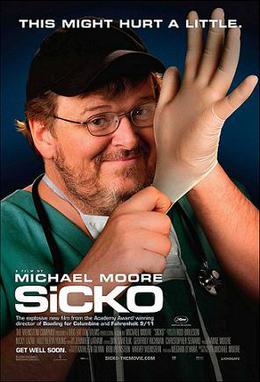“Slicko” Movie on Health Care


You might feel like moving to Canada, UK, France or even Cuba after you watch “Sicko,” Michael Moore’s new entertainment documentary on the US health care system. With his characteristic folksy manner, light humor and up close personal profiles, Moore tackles the convoluted managed healthcare system, and manages to shock, shame and scare the audience…and that includes even those of us who know how this system works and who advocate better coverage.
I wondered if he would touch on pharmaceutical companies, PBMs and chronic disorders like hemophilia. Some things we already knew: Fifty million Americans uninsured (more like 44 million); the US spends a greater percentage of its GDP on health care than any other country (about 15%); the US ranks a dismal 37 in overall healthcare compared to other countries, while France and Canada rate in the top ten. Not a pretty picture. America’s for-profit health care sector is driven by the bottom-line, where medical directors of insurance companies receive annual bonuses for how much money they save the company–through denying claims of ill people. Contrast that to England, where doctors receive bonuses for the number of patients they convince to stop smoking.
Moore’s excursion to Cuba is a highlight of the movie, where he begs for medical care (via a megaphone from a boat) for suffering 9/11 rescue workers from the US naval base at Guantanamo Bay, where al-Qaeda prisoners get state-of-the-art, free care. He is scared off, and instead enters Havana Hospital where his entourage gets free care, treatment and new teeth. Clever and convincing.
This was a good movie, well done, but not his best. It’s myopic and selective. It’s very sad when you learn that 18-month-old Mychelle dies, but then that’s the end of the story. While Moore flits on to the next healthcare system victim, you are left wondering if the mother did not have a multimillion-dollar lawsuit to pursue, but the movie does not provide any details on what happens to those who were denied care with catastrophic consequences. And that makes you realize the movie does not discuss at all the role of litigation and malpractice suits. It also does not discuss the pharmaceutical industry and the role of biologics–which have caused our costs to rise, but are also what the consumer demands.
I found it baffling that Moore focused only on private insurance and the uninsured, yet makes no mention of Medicare, Medicaid, and other state and federal programs. Still, even without mentioning these, he has a strong case for riddling the US healthcare system with holes. Managed care appears a disaster and no one in the movie comes out looking worse than Kaiser Permanente.
Moore’s timing is perfect for the hemophilia community, which has battled managed care and insurance companies for years. The community has been fighting especially hard these last two years to keep factor in the formulary and to ensure choice of product and treatment regime. Moore could have a movie with our community alone.
In trying to take on the entire US healthcare system, Moore is able only to focus on a few cases, limited perspective and few solutions, other than universal coverage, like Canada or England. But the movie is worthwhile, thought provoking, and is “must see” for our community and anyone involved with the healthcare community. Thumbs up!

